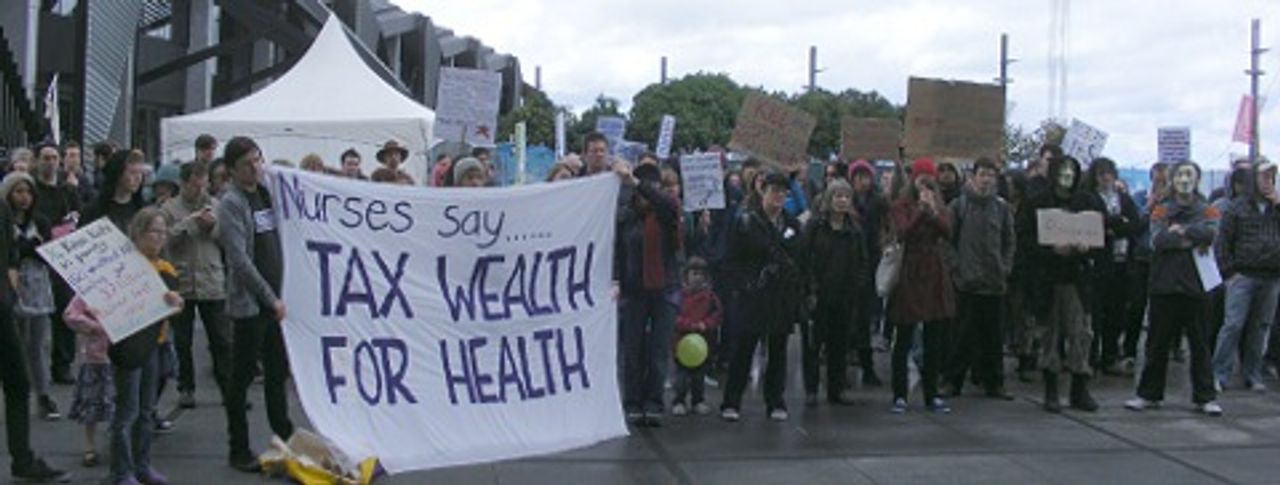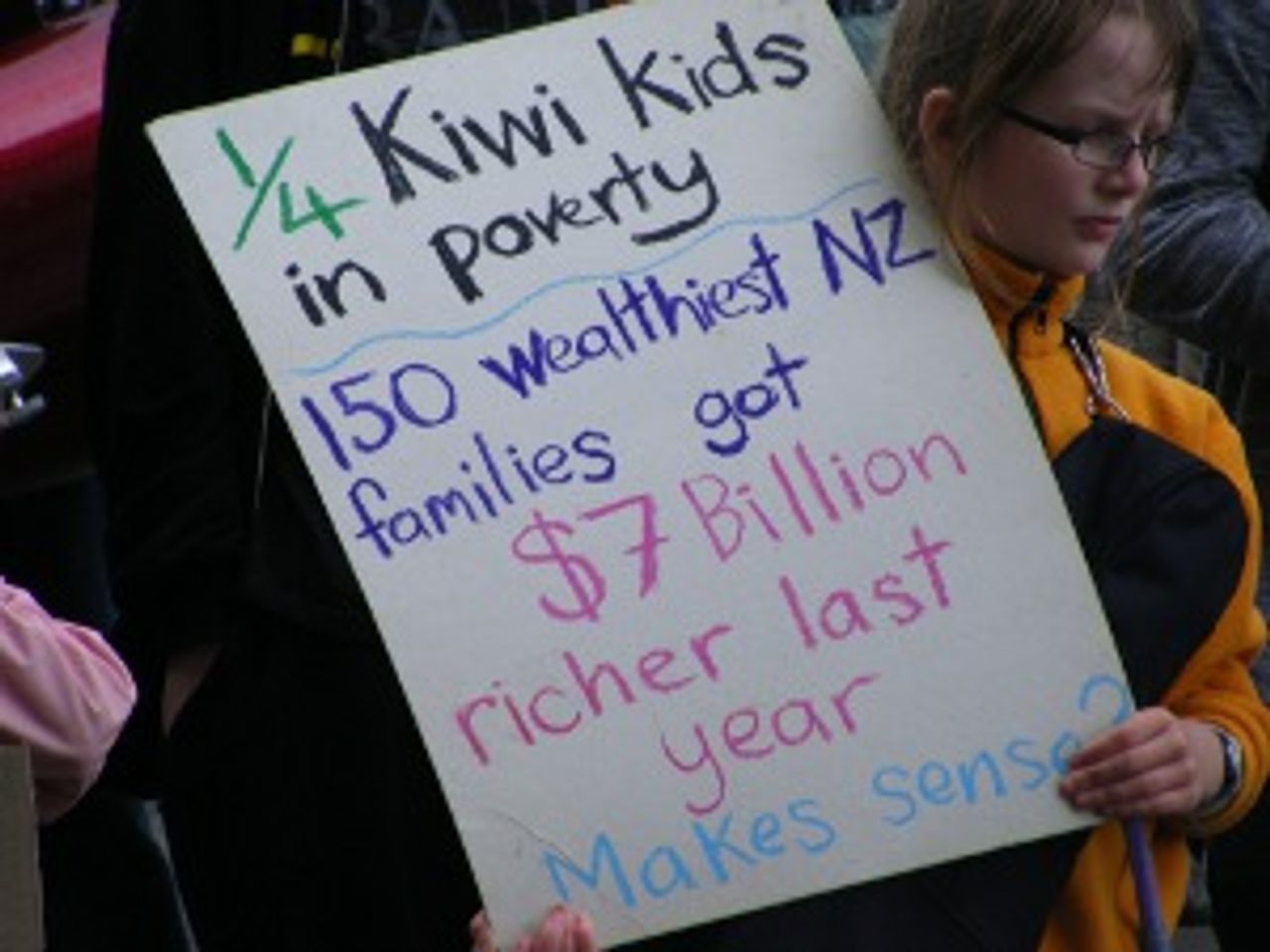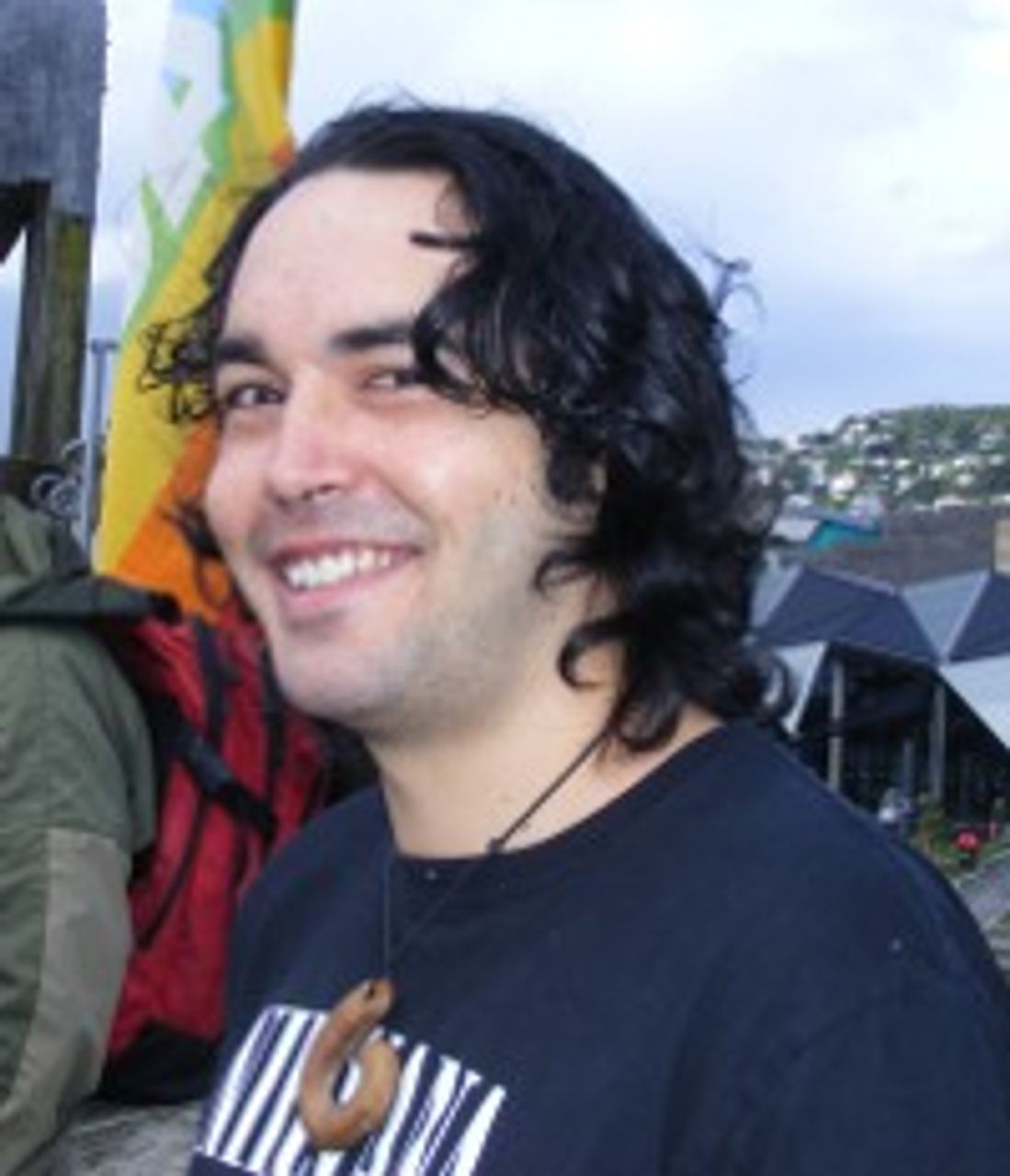Protests inspired by the Occupy Wall Street movement were held in six New Zealand cities on Saturday—Auckland, New Plymouth, Wellington, Christchurch, Dunedin and Invercargill.
The largest was in Auckland, the country’s main commercial centre. Hundreds of people marched through the central business district to Aotea Square chanting, banging drums and denouncing corporate greed. The crowd ultimately swelled to over 3,000.
 Protesters in Wellington
Protesters in WellingtonIn the capital, Wellington, 300 people gathered on the waterfront bridge joining Civic Square with the New Zealand Stock Exchange. Earthquake-ravaged Christchurch saw a gathering of about 60. In Dunedin, protesters camping in the Octagon refused a city council request to leave and said they might remain for weeks. More than 100 protesters and about 30 tents were still in place last night.
In Auckland, tents and camping gear were set up in Aotea Square, with about 100 people intending to stay. A number of protesters said they would occupy public spaces for the next six weeks in the run-up to the November 26 national elections.
The protests, organised by local “Occupy” groups, were led by banners proclaiming, “We are the 99 percent.” The Occupy Wellington group issued a statement declaring that the protest was being held in solidarity with the movement that had begun in New York and spread around the world. The statement highlighted social inequality, noting “the people at the top still profit whilst passing the budget cuts down to us,” adding that the richest 1 percent of the world controlled 40 percent of the wealth, “while people still die every day from lack of basic needs.”

At each rally, many issues were raised on placards and in spoken contributions. They included the social conditions of the working class in New Zealand, such as the high unemployment rate, low minimum wages, child poverty, the rising cost of living, the widening gap between rich and poor and the plundering of the country’s natural resources for profits.
At the Wellington rally, a woman from the South Island’s West Coast said she was participating in remembrance of the 29 miners killed in the gas explosion at the Pike River coal mine last November. The grounding of the cargo ship Rena off the port of Tauranga and consequent oil spill, which has produced New Zealand’s worst ecological disaster, focussed attention on the deregulation of the shipping industry.
A number of grievances were aired against the conservative National Party government, led by Prime Minister John Key. These included the government’s slow response to the Rena disaster, industrial relations legislation that has imposed a 90-day “trial period” for all new hires during which employers can sack workers without reason, and anti-democratic “security” laws that were pushed through parliament this month with the support of the Labour Party opposition.
At the open forum in Wellington representatives of various pseudo-left groups spoke, without identifying their political affiliations, and sought to channel the protests behind the Labour Party and the trade unions—organisations that have demonstrated their total subservience to the interests of the corporate elite. One speaker enthused over the possibility of “something changing” at the forthcoming elections, seeking to sow the illusion that the return of a Labour government would represent an advance for the working class.
Supporters of the World Socialist Web Site circulated copies of the statement “The political issues in the fight against Wall Street” and discussed the genuine political alternative—a conscious break with the Labour and union apparatus, and the construction of a new party of the working class based on the principles of socialism and internationalism.
The WSWS interviewed people attending the “Occupy Wellington” protest in Civic Square.
 Rick
RickRick Gainsford, a polytechnic student from Rotorua, said: “I have a feeling of unease with the way wealth is heading into the hands of the few instead of for the benefit of the many. I think that’s wrong. There’s high unemployment everywhere. I think there’s something like 100 or 130 empty shop fronts in Rotorua, so it seems like the city’s dying.
“It doesn’t make sense to me that we have such a huge budget deficit but still give out tax cuts to the wealthiest people in the country. It’s just nonsensical. I definitely think capitalism seems to have run its course.”
John, an unemployed musician from the United States who has lived in Wellington for the past four years, had been politically animated by the anti-Wall Street protests. “I got disenchanted with politics a long time ago,” he said. “I felt like I had so little control that it didn’t even concern me. I’ve been almost waiting for something like this to happen.”
 John
JohnMichael, a public servant and recent university graduate, commented: “The world financial crisis got me interested in radical economics. I started to visit left-leaning web sites, reading books, getting into the founding figures of socialism and communism, including Karl Marx, in the last three years or so.
“I think that over the last 30 years, the trade unions and communist and socialist parties have all largely been destroyed or co-opted. A movement like this is a start. Hopefully we’ll see more organisation and more radicalisation. Hopefully the movement will spread in disadvantaged communities, among the unemployed, the underemployed, the poorly paid and ethnic minorities.”
